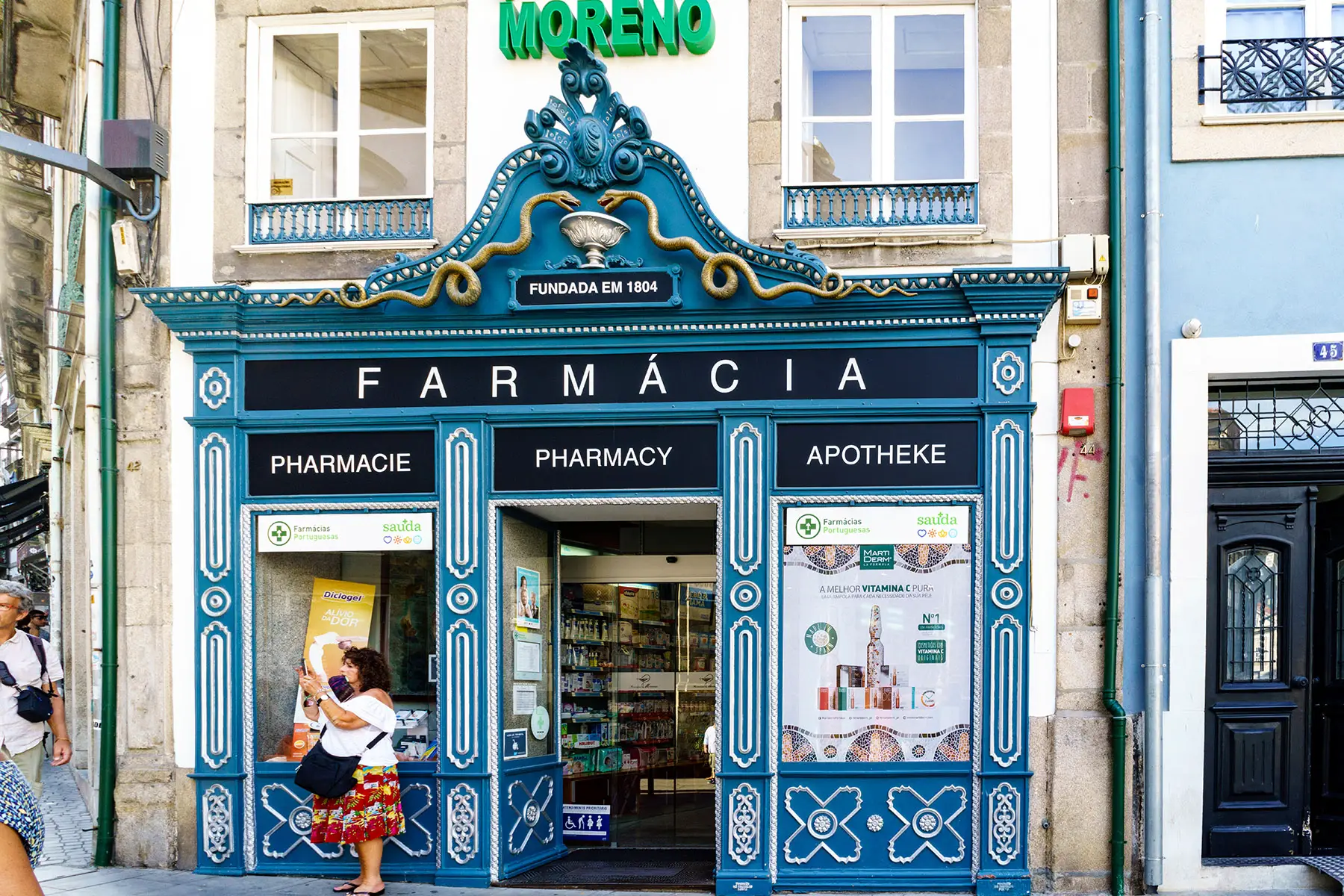Portugal is a popular destination for international retirees thanks to its beauty, relatively mild climate, and friendly people. But whether you’re retiring or already live there, navigating the healthcare system and learning how to fund treatment is crucial for a secure retirement.
Explore various health care services and insurance plans available to the elderly in Portugal in the following sections:
- State of senior health and elderly care in Portugal
- How can expat seniors access Portuguese healthcare?
- Does Portugal have remote healthcare and teleconsultations?
- Health insurance for seniors in Portugal
- Specialists and Medical Centers
- Which vaccines are available for older people in Portugal?
- Dental care for seniors in Portugal
- Hearing and vision care
- Cancer and cancer screenings in Portugal
- Mental healthcare for seniors in Portugal
- Support for neurodegenerative diseases in Portugal
- Chronic disease management
- Home care for the elderly in Portugal
- Other accommodation options for older people
- Palliative and hospice care
Cigna Global
Are you 60+ and looking for private international health insurance? Speak to the healthcare professionals at Cigna Global today and find a policy that’s right for you. They have a global network of doctors, specialists, therapists, and more with tailor-made coverage for seniors. Before starting a new chapter of your life, get peace of mind with Cigna Global.
State of senior health and elderly care in Portugal
Happily for those thinking of retiring in Portugal, life expectancy is just over 81 years, higher than the European Union (EU) average, and over-70s report a high level of life satisfaction. That said, the number of ‘healthy life years’ over the age of 65, that is, ‘without limitation in functioning and without disability,’ is smaller than average for the EU.
As in many countries, life expectancy for women is higher than that of men – at 84 and 78, respectively. About 24% of the population is over 65 (2023), and this is expected to increase to 34% by 2050.

The most common conditions among over-50s in Portugal are:
- Diabetes
- Hypertension
- Rheumatic disease
- Osteoporosis
- Renal calculi (kidney stones)
- Depression
Although Portugal’s healthcare has improved in recent years, the Organisation for Economic Co-operation and Development (OECD) suggests there is room for improvement. The health system’s challenges include a shortage of doctors, difficulties accessing specialists, and underfunding. Portugal’s Recovery and Resilience Plan (PDF) aims to improve the health service by expanding primary healthcare, increasing palliative and home-based care, and providing more telehealth tools.
How can expat seniors access Portuguese healthcare?
Portugal’s national healthcare system, Serviço Nacional de Saúde (SNS) provides free healthcare services to all residents.
To access these services, you need an SNS number. You can receive this at a public health unit by providing your identification, tax identification number (NIF), full address, and residence permit. Retired EU citizens can register with an S1 form.
It’s also possible to use your European Health Insurance Card (EHIC) to access medically necessary treatment or in emergencies. If you’re a UK citizen, you can use your Global Health Insurance Card (GHIC) in the same way.
Although SNS healthcare is free, you may experience longer waiting times and require referrals to specialists. Private health insurance can improve access, supplement SNS services, and provide additional benefits.

To make an appointment with a healthcare provider, you have a few options:
- Visit your local health center in person or call them
- Use the SNS 24 hotline at 808 24 24 24
- Schedule an appointment online through the SNS 24 portal or the SNS 24 app
Appointments on the SNS are free of charge.
Does Portugal have remote healthcare and teleconsultations?
Teleconsultations, or remote health consultations, can improve access to healthcare, especially for Portuguese residents with reduced mobility or living in remote areas. They allow patients to talk to a health professional via a video call.
In Portugal, more than 30% of doctor consultations take place remotely. You can book one through the same channels as in-person appointments. To find out more about the process, visit the SNS 24 website.
In addition to online platforms, you can access digital and telehealth services through the SNS 24 Counter. These physical counters support people who need assistance or do not have the resources to access teleconsultations and other online SNS services.
Health insurance for seniors in Portugal
Public health insurance
The Serviço Nacional de Saúde covers most elderly care services in Portugal and is funded by taxes and social security contributions.
The SNS provides extensive coverage, including consultations, hospital care, and many treatments. You should check which medicines the SNS covers with your health provider, but essential medications are often included. For others, you may need to contribute a co-payment. In some cases, pensioners receive an additional percentage of the cost covered.
Some pensioners can benefit from the Solidarity Supplement for the Elderly (Complemento Solidário para Idosos – CSI). This system gives immediate discounts on medicines and assistance with other healthcare needs such as glasses, lenses, and dental care.

Madeira and the Azores have their own healthcare systems:
- Azores Regional Directorate for Health (Direção Regional de Saúde – DRS)
- Health Service of the Autonomous Region of Madeira (Serviço de Saúde da Região Autónoma da Madeira – SESARAM)
Private health insurance
Private health insurance can provide additional coverage beyond the SNS. It can cut your waiting times and means you don’t necessarily need a referral to see specialists. Furthermore, you’ll have access to private facilities and more comprehensive coverage.
This coverage is particularly beneficial for seniors seeking specialist care, such as geriatrics and orthopedics. Additionally, many private health insurance providers in Portugal offer direct billing, meaning you don’t need to handle complex reimbursement procedures.
The cost of private health insurance can vary based on your age and specific needs. Therefore, it’s essential to research different providers, read online reviews, and check the coverage details carefully.
International private health insurance for seniors
International providers, such as Cigna Global, offer health insurance plans specifically tailored to expats aged 60 and over living in Portugal. These policies typically cover common illnesses, emergencies, and provide optional coverage for dental care, vision, and other specialized needs.

Unlike other options, international plans for seniors often have no upper age limits and may include coverage for certain long-term and pre-existing conditions. For expats who prefer quicker treatment, shorter waiting times, and access to English-speaking doctors, exploring international private health insurance could be a practical choice.
Specialists and Medical Centers
The elderly in Portugal have access to a wide range of specialist care through the SNS and private healthcare providers. This includes consultations and treatments from specialists in cardiology, geriatrics, orthopedics, neurology, and other areas focused on managing age-related health conditions.
You’ll usually need a referral from a general doctor to access specialist care through the SNS. Private insurance, however, allows for more flexibility and quicker appointments.
Many hospitals offer geriatric care, and notable medical centers like Campus Neurológico Sénior provide specialized services for seniors.
Which vaccines are available for older people in Portugal?
There are several recommended immunizations for over-65s in Portugal. For example, the National Vaccination Program (Programa Nacional de Vacinação) provides free tetanus and diphtheria boosters at 65 and every 10 years afterward.
Although not part of the National Vaccination Program, the SNS offers free influenza and COVID-19 vaccines to over-60s. You can receive these vaccines at participating pharmacies after scheduling an appointment through the Portuguese pharmacy portal. It’s also possible to receive both vaccines in one appointment.
In addition to scheduled vaccines, you may need additional immunizations when traveling abroad. You can receive these at an international vaccination center (centro de vacinação internacional). The SNS doesn’t cover the costs of these vaccines, so check with the clinic for specific fees.
Dental care for seniors in Portugal
In Portugal, anyone can access public dentistry if they are registered. First, you must make an appointment with your doctor to get a referral to the dentist. The doctor can only refer you to a dentist in your health center group. Consultations, diagnostics, and therapeutic exams are free, but further treatment may require payment.
Senior citizens who qualify for CSI benefits can receive dentist vouchers from their doctor. These vouchers cover the cost of two checks and up to three treatments per year. Treatments covered include:
- preventive treatments
- restorations
- root canals
- extractions
- scaling
- root planing
For more extensive dental coverage, international seniors may consider getting private health insurance, which can help offset expenses, provide a wider range of services, and offer more flexibility in the choice of a dentist.
Cigna Global
Are you 60+ and looking for private international health insurance? Speak to the healthcare professionals at Cigna Global today and find a policy that’s right for you. They have a global network of doctors, specialists, therapists, and more with tailor-made coverage for seniors. Before starting a new chapter of your life, get peace of mind with Cigna Global.
Hearing and vision care
If you’re an elderly person experiencing vision problems in Portugal, visit your general doctor to get a referral to an eye care specialist. Which specialist you see depends on the issue – if you have a disease of the eye, you’ll go to an ophthalmologist. For glasses and lenses, you may visit an optometrist or optician.

Check with your healthcare provider to find out if these appointments are covered. Portugal only covers the cost of glasses if you receive some form of social support. For example, if you receive CSI, you can receive 75% of the cost of your glasses, up to €100.
Seniors experiencing hearing problems should contact their doctor, who can refer them to an audiologist. They can examine and test your hearing to find out whether you are experiencing hearing loss and to what extent. Furthermore, they can determine whether you need a hearing aid.
Social security covers some prescribed products that can help with disabilities, including hearing loss. Check with your health center to find out whether you are entitled to financial support.
Cancer and cancer screenings in Portugal
Cancer is the second most common cause of death in Portugal after circulatory conditions, accounting for 23% of mortalities in 2020. However, the country’s cancer rates are lower than the EU average.
To drive down the rates of cancer in the country, the government has implemented the National Cancer Control Strategy 2030 (PDF), which focuses on:
- Prevention measures: such as physical activity, healthy eating, and improving environmental factors
- Better detection: access to screening, enhancing quality and safety, and providing training to healthcare professionals
- Treatment
- Better measuring: strengthening data collection and analysis for monitoring
Cancer treatment in Portugal is free for eligible elderly patients, including transport to the hospital for medical care. The SNS also covers 95% of the costs of pain medication and other necessary medicines the hospital provides.
Age-related cancer screening in Portugal
Portugal also has two main screening programs for over-50s, who may be at more risk of cancer.

These are:
- Breast cancer screening: every two years for women between 50 and 69
- Colorectal cancer: for everyone aged 50–74, every two years. The screening involves testing for hidden blood in the feces.
You can access screening by making an appointment with your healthcare center, which will provide a prescription for the examination.
Mental healthcare for seniors in Portugal
Portugal has the highest mental health burden in the EU, with many older adults experiencing loneliness. Although mental healthcare represents a low share of total health expenditure in the country, help is available.
People with mental health difficulties may encounter symptoms such as:
- Persistent sadness
- Loss of interest in activities
- Feelings of hopelessness
- Changes in appetite or sleeping patterns
- Difficulty concentrating
If you are experiencing these symptoms and require help, contact your general doctor. They may be able to refer you to a mental healthcare service or professional. Some mental health consultations are covered by the SNS, but check with your provider for specific details.
For further support, check the SNS website for a list of mental healthcare contacts and the Voz de Apoio website and helpline for anonymous emotional support.
Support for neurodegenerative diseases in Portugal
Neurodegenerative diseases in Portugal are becoming more common as the country’s population ages. These types of conditions include dementia (such as Alzheimer’s) and Parkinson’s disease.

Alzheimer’s and dementia
The prevalence of Alzheimer’s disease, the most common form of dementia, has significantly increased in Portugal in recent years, rising by 38.1% from 2009 to 2019.
Alzheimer’s disease causes the gradual deterioration of memory, cognitive functions, and the ability to perform everyday tasks. Although there is no cure for dementia, with early detection, patients can access care and support more quickly, manage their symptoms, and improve their quality of life.
The early signs of dementia may include:
- Memory loss
- Confusion
- Personality changes
- Apathy and isolation
- Inability to perform daily tasks
If you notice any of these symptoms, you should first seek advice from a general doctor who can check the symptoms and refer you to a specialist for a formal diagnosis if necessary.
Many hospitals have specialized care units for dementia patients. Patients can visit day centers for day-to-day care, medical supervision, activities, and meals.
Organizations such as Alzheimer Portugal provide support and advice for those experiencing dementia and their loved ones. You can also reach them by phone, on 964 604 626.
Parkinson’s Disease
An estimated 22,000 people in Portugal are affected by Parkinson’s disease, a progressive neurological disorder that primarily affects movement control. The condition is most common after the age of 60.
Symptoms can include:
- Tremors
- Rigidity
- Slowing of body movements
- Postural instability
- Changes in gait
To get a diagnosis, visit your doctor for a referral to a specialist. The healthcare system covers consultations and day hospital sessions, but some treatments, such as speech therapy and physiotherapy, may not be fully covered yet.

For additional support and advice, contact the Associação Portuguesa de Doentes de Parkinson (Portuguese Association of Parkinson’s Patients – ADPK).
Rehabilitation and physical therapy for the elderly in Portugal
Portugal offers a range of rehabilitation and physical care therapies tailored to the elderly, aimed at improving mobility, strength, and quality of life. You can make an appointment with a referral from a doctor.
The Associação Portuguesa de Fisioterapeutas (Portuguese Physiotherapist Association – APFISIO) has a list of more than 12,000 physiotherapists that you can use to find one in your area. There are also several specialist rehabilitation centers throughout the country.
The SNS covers some rehabilitation costs, but you may need to pay a co-payment for certain treatments. Private health insurance can cover these services and provide quicker access and more extensive options. For more information and advice on physiotherapy and rehabilitation in Portugal, visit the Sociedade Portuguesa de Medicina Física e de Reabilitação (Portuguese Society for Physical Medicine and Rehabilitation – SPMFR).
Chronic disease management
Those with chronic and long-term conditions may find it affects their quality of life in Portugal. However, plenty of services are available for managing age-related health issues, including cardiovascular diseases, diabetes, and arthritis. The SNS covers many aspects, reducing patients’ financial burden.
Managing arthritis in Portugal
Arthritis (artrite) is an autoimmune disease characterized by joint inflammation. While the exact cause is unknown and there is no cure, early treatment can manage symptoms and improve quality of life. Medications are often used to reduce inflammation and pain.
If you notice joint pain, make an appointment with your doctor as soon as possible. Early intervention can help slow the disease’s progression and alleviate symptoms.
Portugal has several care centers in different areas dedicated to arthritis treatment for the elderly. Additionally, the Portuguese Society of Rheumatology provides resources and support for those affected.

Diabetes
Diabetes affects approximately 13% of the population in Portugal, according to the International Diabetes Federation (IDF). This prevalence is lower than in neighboring Spain but higher than in France and Italy, and the rate has doubled in the last 20 years.
Common symptoms of diabetes include:
- Excessive thirst
- Frequent urination
- Unexplained weight loss
- Persistent tiredness
- Irritability
- Blurred vision
- Frequent infections.
If you experience these symptoms, visit your doctor for an evaluation. Portugal’s treatment care for diabetes among the elderly include insulin therapy, monitoring blood glucose levels, a healthy diet, and exercise. The Associação Protectora dos Diabéticos de Portugal (Protective Association of Diabetics of Portugal – APDP) provides support and resources.
Circulatory diseases
Cardiovascular or circulatory diseases, including stroke and heart disease, are the leading cause of death in Portugal. Therefore, the National Health Plan 2030 (Plano Nacional de Saúde, PDF) highlights these diseases and aims to reduce premature and preventable deaths and disabilities resulting from them.
If you experience any of the following symptoms, seek medical advice promptly:
- Swollen legs
- Persistent tiredness
- Shortness of breath
Portugal has several associations dedicated to supporting individuals with cardiovascular diseases, including the Associação de Apoio aos Doentes com Insuficiência Cardíaca (Support Association for Patients with Heart Failure – AADIC) and the Sociedade Portuguesa de Cardiologia (Portuguese Cardiology Society).
Home care for the elderly in Portugal
Seniors usually wish to continue living in their own homes for as long as possible to retain their independence and quality of life.

Portugal has several care services that make this possible while providing elderly support where needed. These include:
- Day centers (centros de día) – These locations offer activities designed to help older people integrate into the community, preventing loneliness and isolation. They provide social and recreational activities that promote mental and physical well-being.
- Home support services (Serviço de Apoio Domicilário – SAD) – These services assist with daily activities and can offer training and awareness programs for family members and informal caregivers.
- Night centers (centros de noite) – These centers provide accommodation, support, and night-time care for seniors who live at home during the day. They also help prevent loneliness and isolation.
These services are usually aimed at people who can live independently, require some form of assistance, and lack family support. They may offer hygiene and home care, meal support, and activities including socializing and transport.
The fees for these services depend on family income, and some may be covered by social security. Find out more about the conditions and how to apply on the ePortugal website.
Does Portugal provide support for caregivers?
Caregivers in Portugal can access support to help them in their role. In addition to the training provided by Home Support Services, caregivers may be eligible for a subsidy. They must be under pension age, and their reference household income must be under €662, calculated on a weighted basis.
The monthly subsidy amount is the difference between the primary informal caregiver’s income and the “reference value of the subsidy” (€509.26 in 2024). It can be combined with some benefits but not others, so check the conditions before applying.
Caregivers can apply for financial support online, in person, or by mail.
Other accommodation options for older people
Nursing homes in Portugal are aimed at over-65s and can provide temporary or permanent care. These facilities offer nursing care tailored to the needs of elderly residents.

Residential Structures for Elderly People (Estrutura Residencial para Pessoas Idosas – ERPI) are residential care facilities designed for seniors who need assistance with daily activities and nursing care. They provide accommodation, meals, medical care, personal care, and social activities. The availability and conditions of ERPIs depend on your location, so contact your municipality for specific information.
For example, in Lisbon, eligibility often requires that you
- Do not have family members to care for you
- Lack of adequate housing conditions
- Have limited financial resources
- Need support that cannot be provided elsewhere
Portugal has public and private residences, and you can choose which one is more suitable. Although public nursing homes come at a lower cost than private ones, they often have very long waiting times, so you may need to plan ahead.
An alternative to a nursing home is family caregiving, which functions like a fostering care arrangement for elderly individuals. For a fee, older people can live in a family environment while receiving the care they need.
Palliative and hospice care
Palliative care is available in Portugal to support patients with terminal or prolonged serious illnesses, aiming to alleviate suffering and improve quality of life. A multidisciplinary team of medical and social professionals provides this care, which can begin in the early stages of the disease.

The following services are available in Portugal:
- 25 inpatient units
- 23 intra-hospital teams
- 11 home care teams, who provide palliative care at patients’ homes and offer support and training for family members and caregivers
Despite being recognized as a human right, palliative care in Portugal faces several challenges, including low political priority and limited availability of services. For example, the Associação Portuguesa de Cuidados Paliativos (Portuguese Association of Palliative Care – APCP) mentions inconsistent coverage across the country, with some districts having no palliative care at all.
Fortunately, financial and social support is available for people with serious illnesses in Portugal. Special disability protection from Social Security protects those who can no longer work due to their condition. This benefit does not apply to people over pension age. However, the Supplement for dependency (complemento por dependência) is a monthly payment that can help people who need assistance in daily life.
Charities also support those affected by serious illness. For example, Madrugada provides English-language care, counseling, and other services in the Algarve region. Portugal Compasivo has a wealth of guidance and resources for end-of-life care, helping patients navigate of palliative care and ensuring their needs are met with dignity and respect.
Advanced directives and planning for end-of-life care
In Portugal, people can create advanced directives to express their healthcare preferences for situations when they might be unable to communicate. Anyone living in the country can set up an advanced directive, but you require an SNS number.
You can register your advanced directive at a National Registry of Living Wills (Registo Nacional do Testamento Vital – RENTEV) counter. You must sign it in person at the counter or send it via mail with a signature recognized by a notary. Alternatively, you can fill out the form online (template in PDF) in the personal area of the SNS website and submit it at a desk.
The user, RENTEV, and healthcare professionals can access the advanced directive, and the patient receives a notification if anyone consults it.

In May 2023, the Portuguese Parliament voted to legalize euthanasia for people with incurable diseases. However, as of April 2025, the law has yet to take effect.
Alternative and complementary care
There are several types of alternative and complementary care in Portugal which patients may feel enhance elderly care and improve age-related health concerns. They include:
- Acupuncture
- Herbal medicine
- Homeopathy
- Chiropractic care
- Osteopathy
These types of healthcare are generally not covered by the SNS, so you will either need to pay out of pocket or take out a private insurance policy that covers them. You should also check that the provider is a licensed professional before booking an appointment.
Cigna Global
Are you 60+ and looking for private international health insurance? Speak to the healthcare professionals at Cigna Global today and find a policy that’s right for you. They have a global network of doctors, specialists, therapists, and more with tailor-made coverage for seniors. Before starting a new chapter of your life, get peace of mind with Cigna Global.
Useful resources
- APCP – information and guidance for palliative care
- Cancro Online – support and advice for those affected by cancer in Portugal
- Carto Social – find community services such as day centers for seniors
- ePortugal – information on different services, benefits, and allowances for health in Portugal
- SNS 24 – online personal area of Portuguese public health services
- Social Security – details of different benefits and pensions available for Portuguese residents










